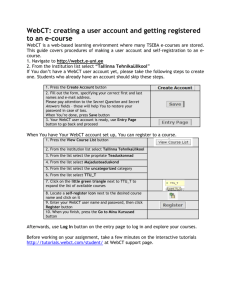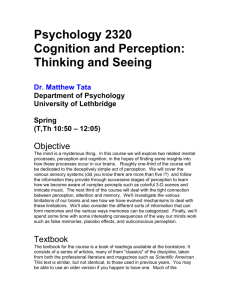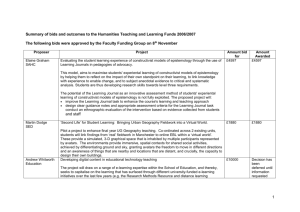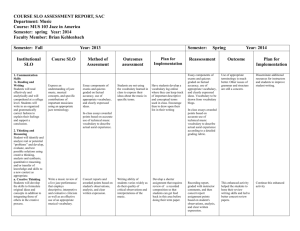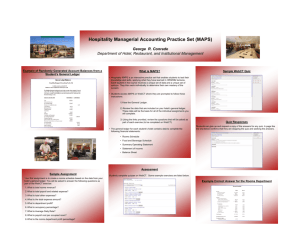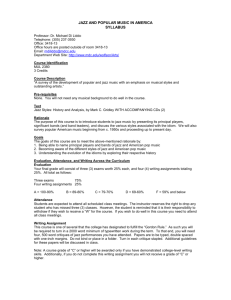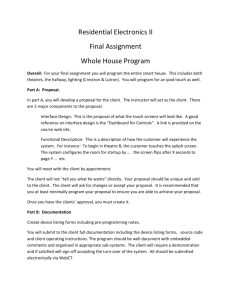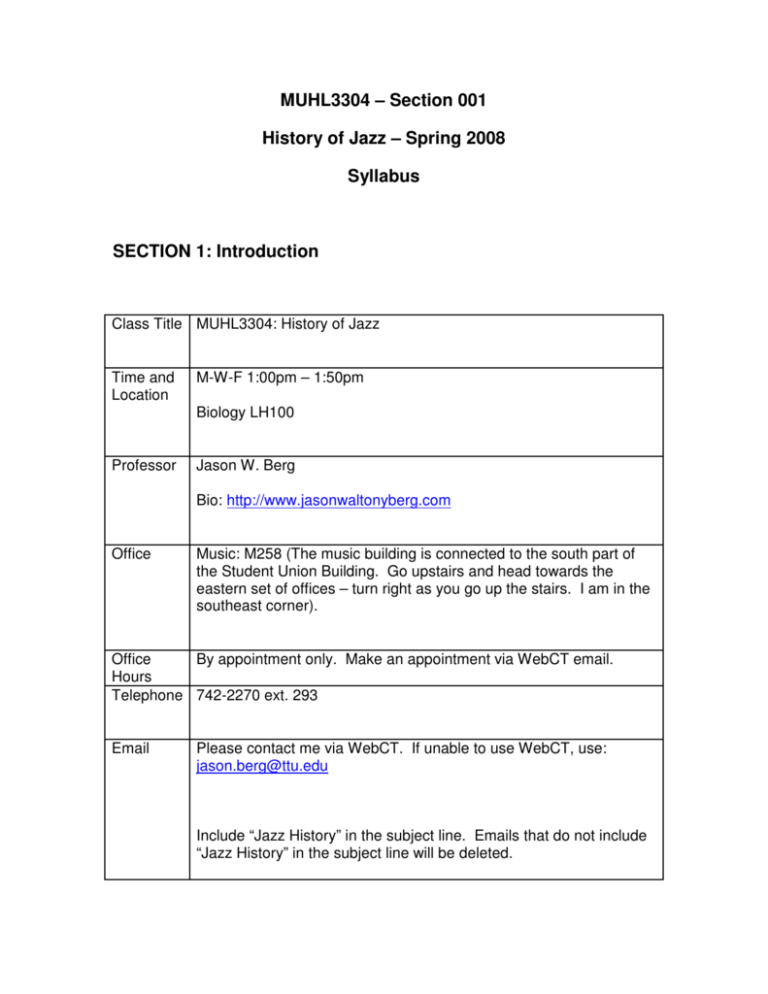
MUHL3304 – Section 001
History of Jazz – Spring 2008
Syllabus
SECTION 1: Introduction
Class Title MUHL3304: History of Jazz
Time and
Location
M-W-F 1:00pm – 1:50pm
Biology LH100
Professor
Jason W. Berg
Bio: http://www.jasonwaltonyberg.com
Office
Music: M258 (The music building is connected to the south part of
the Student Union Building. Go upstairs and head towards the
eastern set of offices – turn right as you go up the stairs. I am in the
southeast corner).
Office
By appointment only. Make an appointment via WebCT email.
Hours
Telephone 742-2270 ext. 293
Email
Please contact me via WebCT. If unable to use WebCT, use:
jason.berg@ttu.edu
Include “Jazz History” in the subject line. Emails that do not include
“Jazz History” in the subject line will be deleted.
Please include your full name on all correspondence.
I check email between 9am and 5pm Monday through Friday. If
send an email late at night or over the weekend please do not expect
a response until the next business day.
Class
Website
Student
Assistants
http://www.webct.ttu.edu
Please contact your student assistant with any questions or
concerns you may have first, if they cannot help you then please feel
free to contact me. You should also submit all extra credit
assignments to them through WebCT. Your assigned student
assistants are:
Trent Wester (eraider: twester) Students whose last names begin with A - G
Andrew Ybanez (eraider: aybanez) Students whose last names begin with
H-Q
Rob Grote (eraider: rgrote) Students whose last names begin with R – Z
Required
Textbooks
and
Materials
Gridley, Mark. Jazz Styles, History and Analysis, 9th Edition.
Pearson / Prentice Hall.
ISBN: 0-13-193115-6
Jazz Styles presents an overview of jazz history in such a way as to
help the reader/listener develop and increase their appreciation of
jazz. There is an accompanying CD set which you may purchase
but all the recordings for the class will be available through the
WebCT site.
Turning Point Student Response System – ResponseCard RF.
This card enables you to participate in the class through answering
questions electronically that are presented during class lecture. It is
also how credit towards participation is earned. It is critical that you
buy the correct card. Here is the website that has the information
about the card:
www.turningtechnologies.com/interactiveaudienceresponseproducts/responsecards/responsecardrf.cfm
This card is available through the campus bookstore and various
local bookstores.
***IMPORTANT***
We will use the Turning Point Student Response system as part
of this class. Therefore you must purchase a Turning Point
ResponseCard RF is you wish to receive participation credit
while you are in class.
Additional
Required
Readings
There will be additional required readings throughout the semester
that will be available in PDF from the WebCT website. These are
required reading and will be considered testable material for the
reading quizzes, the midterm and the final exam. Please see the
course schedule for which readings will be tested and when.
Optional
Porter, Lewis. Jazz, a Century of Change. Thomson / Wadsworth.
ISBN: 0534649416
Reading
Jazz, a Century of Change presents a series of readings over a
wide variety of topics important to the history of jazz and this course.
Dr. Lewis Porter introduces various topics and provides primary
source material in the form of writings of various jazz scholars and
journalists from across a wide time period. Some of the articles that
I will assign in PDF format will come from this book and so if you
prefer a hard copy of the text you might want to buy this book. I will
also refer to this book during lectures and so you might want to
consider purchasing it.
SECTION 2: Course Content, Purpose, Expected Outcomes and
Assessment
(This section required by Tech for all courses)
Course Content:
MUHL3304 is designed as an introduction to the history of America’s greatest
cultural contribution to the world, Jazz. Through this class students will explore
the major styles of jazz and its primary practitioners. In addition, students will
develop an understanding of the cultural and social background that gave birth to
jazz music and influenced its development. The course begins with helping the
student develop some of the background aural skills and knowledge necessary to
appreciate jazz and then advancing to an investigation of just what is “jazz”. It
then traces the history of jazz from the late 19th century to the present day. The
course will include lectures, listening, in-class activities and discussion.
Assessment will be done through web-based quizzes and exams as well as
through student participation utilizing student response technology.
Course Purpose:
In this course, students will have the opportunity to engage themselves in a
serious study of one of America’s most important cultural contributions to the
world, jazz. It traces the history of the development of the music and the social
and cultural factors that gave birth to it, influenced it and ultimately were
influenced by it. Students will begin to develop a deeper appreciation and
understanding of jazz and through it, music as a whole while constructing the
listening, reading and analytical skills necessary to be culturally conversant.
This course applies towards the Visual & Performing Arts requirement.
Core Curriculum Objective:
The objective of the visual and performing arts in a core curriculum is to expand
students’ knowledge of the human condition and human cultures, especially in
relation to behaviors, ideas, and values expressed in works of human
imagination and thought. Through study in disciplines such as the visual and
performing arts, students will engage in critical analysis, form aesthetic
judgments, and develop an appreciation for arts as fundamental to the health and
survival of any society.
Expected Learning Outcomes
Upon completion of this course, students should be able to:
1. Listen to an example from a style of jazz studied in class, comprehend its
distinctive characteristics, and articulate those characteristics.
2. Listen to an example from a style of jazz studied in class, identify its
characteristics, and develop conclusions about its genre and historical contexts
of its origin.
3. Identify representative pieces chosen from each period, and draw intelligent
conclusions about probable genre, artist, and approximate date.
4. Recognize, define, and employ significant terms and concepts introduced in
the readings or lectures.
5. Describe the broad historical context, likely social function, and probable
performance circumstances for a piece on the class listening list (and for pieces
of similar types).
6. Listen to an example from a style of jazz studied in class, and articulate a
comparison to other styles of jazz discussed in class.
7. Employ a range of technical language to identify, discuss, compare, and
integrate aspects of musical style within jazz idiom.
8. Describe and compare a range of jazz styles, and relate their style
characteristics to aspects of cultural history.
9. Listen, read, speak, and think critically about the relationship between musical
style and cultural history.
Additionally, students should be able to:
1. Identify the value and necessity of music in culture and society.
2. Compare the relationship between the audience and the artist.
3. Describe the artist’s responsibilities and activities.
4. Demonstrate comprehension of musical arts as an historical form of literature
and communication through critical analysis presented in written essay or oral
presentation.
5. Develop or improve critical thinking and communication skills such as listening,
reasoning, analysis and criticism.
Methods for Assessing the Expected Learning Outcomes
The expected learning outcomes will be assessed by a combination of webbased quizzes, examinations, listening exams, and optional short written extracredit assignments, as detailed below in the “Course Requirements” section.
SECTION 3: Course Requirements
Lectures and Regular Class Attendance
In class sessions, we will listen to, analyze, and discuss a wide variety of jazz
styles, artists as well as specific, historically significant records. Class time will be
spent in lecture, discussion, listening, and viewing. Lectures will include the
following:
•
•
•
•
biographical and historical data about artists
technical and stylistic characteristics of different forms of jazz
political, social and cultural history relevant to jazz and the specific styles
being discussed
video and audio examples of the music being discussed
Much of the material covered in class will NOT be duplicated in readings or
in the WebCT listening examples. It should be understood that anything
contained in the lectures is “fair game” for all examinations. Therefore,
failure to attend class consistently and take adequate notes lowers the
likelihood of adequate performance on examinations. The Power Point
slides used during the lectures will help you with your note-taking, but you
are responsible for all the material in the lectures, not just the summarized
information on the slides.
In Class Participation
In class we will use the Turning Point Student Response System. This system
registers your response to questions posed during class and will display the
answers as part of the in-class presentation. Therefore, your participation in
class is essential to the success of each class. Students receive 5 points for a
correctly register Turning Point Student Response System and on every class
day that the system registers you as being in class you will receive one points
towards your participation grade (up to a maximum of 40 points) which will factor
into to your final average.
Use of this WebCT site (www.webct.ttu.edu)
Using the Website is part of the course requirement. You are responsible for
all the information contained in it.
•
•
•
•
In addition to being the medium through which you are tested, this WebCT
site is full of information about the class, including details about the extra
credit assignments and extensive listening resources. It is an integral part
of the class -- PLEASE USE IT.
Take some time to click on every single icon and see what’s contained on
all the pages.
Make sure that you read the page about taking WebCT exams, even if you
have had WebCT classes before.
The Listening Room pages are fantastic, fun, and crucial to doing well on
the Listening Exams.
Remember also that WebCT also lets professors track individual student usage
of the website, page by page. If I see you do poorly on the Listening Exam, and
then I discover that you have never even accessed the Listening Resource
page…. well, then there is not much more to be said…
Computer Access – IMPORTANT
•
•
•
MUHL 3304 is a WebCT course that relies heavily on web-based
activities, including quizzes and exams as well as many of your listening
resources. It is essential that students have access to a reliable, FAST
computer with internet capabilities.
You must have a current e-Raider account in order to access the
WebCT site.
Do not try to use a dial-up connection to do your WebCT
•
•
•
assignments. If your computer is slow, doesn’t support audio
applications, or if your internet connection is subject to busy signals and
disconnects, use a computer on-campus (for example, at ATLC in the
basement of the Tech Library; bring headphones.)
It is the student’s responsibility to make sure that he or she has access
to good, reliable computer resources.
It is also the student’s responsibility to address technical problems if
they come up. If a technical problem has affected a quiz or exam, you
MUST report the technical problem to ITHELP or ATLC when it happens,
so they have a record of what occurred and when it occurred.)
It is the student’s responsibility to check his or her WebCT site (including
WebCT email) on a daily basis. WebCT will be used for announcements
and/or updates regarding assignments, review materials, scheduling
issues, grades, and test dates.
Assigned Readings (in your textbook and from the Reading Room),
Readings Quizzes(on WebCT), Reading component on Exams
The Jazz History course requirements include a *substantial* amount of
reading. Most of it is a “fast read,” but it is still a LOT of reading. Please
keep this in mind when assessing how much work the class will entail.
The Readings Quizzes will focus on concepts, trends and ideas, and NOT
on tiny biographical details or other minutiae.
Many of the readings cover material that is not covered in class.
•
•
•
•
•
•
The assigned readings for MUHL3304 will be taken from the required
textbook and additional readings that will be posted on the WebCT site.
A detailed list of the Assigned Readings, along with a suggested reading
Schedule, is given in the Course Calendar.
There will be FOUR Reading Quizzes, administered on WebCT and
available on WebCT for one week.
In addition, there will be a reading component included in the Midterm and
the Final.
On each quiz, there will be 15 questions worth 1 point apiece. The quizzes
will be timed; you will have 45 minutes to complete each quiz.
Please see the Course Calendar for the specific dates of these
Readings Quizzes.
Listening Materials (WebCT)
There will be a number of listening examples available through the WebCT site.
The questions on the Listening Examinations will be taken from these examples
and from musical examples listened to in the course of the class lectures. The
WebCT listening examples are not intended for download in any way, shape or
form – you must listen to them via the password-protected WebCT site.
Listening Exams (WebCT)
•
•
•
There will be two Listening Exams. The first opens on February 19th and
the second on April 15th. Both exams will be available for only three days.
Each will be worth 50 points.
One prepares for the Listening Exams by listening to music which is
posted in the listening room section of the WebCT site and by following
along with the listening guides (when provided) in the Jazz Styles text as
well as by studying the materials contained in the accompanying slides.
Students will be given a list of the specific pieces that will be covered on
the exam.
The Listening Exam itself will involve listening to a brief audio example
and answering at least one multiple-choice question about that example.
IMPORTANT!!
The Listening Exams will be open on WebCT for three days ONLY.
The on-line listening slides and music will be taken OFFLINE for the
duration of the Listening Exam’s availability.
This means you CANNOT study the Listening Examples during the
three day period when the exam is open.
You must do the studying BEFORE the exam opens! Plan accordingly.
There are no make-ups for the listening exams.
SECTION 4: Grading
MUHL3304 is graded on a point system. Percentages are only used to calculate
mid-semester grades.
You are responsible for your own performance in this class. Please monitor your
progress through the My Grades section of the WebCT site. This is especially
important for participation points and extra credit.
The final grade is by calculated by total number of accumulated points, as
follows:
The highest possible number of points, not including extra credit, is 400:
Midterm:
100
Final:
100
Class Participation
40 ( please see below)
Reading Quizzes:
60 (four, at 15 points apiece)
Listening Exams:
100 (two, at 50 points apiece)
TOTAL: 400 possible points.
A = 400-360
B = 320-359
C = 280-319
D = 230-279
F = Below 230 points
Once you have 360 points in the class, you have an A.
Class Participation. There are 40 points for participation in this class. You will
receive 5 points for registering your PRS card correctly and one point for each of
classes that you attend starting Monday, January 14, 2008. THE ONLY WAY I
HAVE OF KNOWING YOU ARE IN CLASS is through the Turning Point PRS
system. Thus, you must have a correctly registered Turning Point RF Response
Card if you wish to receive participation points (You register your card here http://www.depts.ttu.edu/prs/ ). You will receive one point for each class I have a
record of you attending through this system. I tally participation points weekly
and I suggest that you check each week to see that you are getting credit for
participation. This is ultimately your responsibility.
FAQ: If I do enough Extra Credit to increase my point total to 360, does this
mean I can skip the final?
Answer: The absolute maximum number of extra credit points you can get
in this class is 130. (See Section 5, Extra Credit Options, below.) That
would mean that you did every possible extra credit assignment, AND you
scored the maximum number of possible points on each one (extra credits
are granted on quality as well as quantity.) It may be possible to do so
much extra credit that you already have 360 points before the final – but
each extra credit assignment has to be done by a certain date, so it’s a
gamble; plus, it’s a heck of a lot easier to just show up for the lectures, take
notes, and take the final.
The final grades will be posted by noon, Wednesday, May 7th.
There will be NO grade changes made after the 12th of May.
PLEASE NOTE: Due to a change in University policy, it is no longer
possible to receive a grade of “WF” for a course. If a class has not been
dropped within the specified time period, the student must complete the course
and receive a grade. If you need to drop the course for any reason, you
MUST do so by March 12, 2008.
Section 5: Extra-Credit Assignment Options
The extra credit options for MUHL3304 are designed to encourage the
student to pursue more in-depth study of specific genres, musicians, or
ensembles. There are many extra credit options that are part of this class.
If you choose to do extra credit assignments please make sure you follow
the instructions for each assignment exactly and precisely. Extra Credit
assignments should be submitted electronically to your TA and to the
Instructor through WebCT. Please utilize the old Microsoft Word format
(97-03) of .doc when you save your documents as this is the easiest for
anyone to open. Turn-around on all extra credit assignments is one week.
“IMPORTANT NOTE” – For concert/gig reviews – These reviews must be
handed in no later than one week after the event has past or they will not
be considered. As they require a signature, these are the only extra credit
assignments that should be handed in as a hard copy. Place the review
and supporting materials in the incoming folder appropriate to you (it is
organized by last name) 5 minutes prior or after class. Your review will be
corrected and placed in the outgoing folder one week after you turn it in.
Extra Credit assignments are graded on the basis of quality as well as
quantity. You are not guaranteed the full possible number of points unless
you have satisfied all the criteria of the assignment as described on the
WebCT site. For example, if your film review is three sentences full of
misspellings and grammatical mistakes, do not expect to get the total
number of available points.
1. Film Review – 10 points of extra credit *if all criteria are met.*
To view the criteria and see more information on this extra credit option,
go back to our WebCT Homepage, Click “Info Center, then click “Extra
Credit” options, then click “Film Review.”
Maximum of 2 Film Reviews accepted per semester.
DUE DATE: February 29th (No film reviews will be accepted after 2/29).
2. Radio Program Review – 10 points per view *if all criteria are met*
To view the criteria and see more information on this extra credit option, go
back to our WebCT Homepage, Click “Info Center,” click the “Extra Credit,”
then click “Radio Program Review.”
Maximum of 2 Radio Program Review accepted per semester
DUE DATE: March 14th (No radio program reviews will be accepted after
3/14)
2. Annotated Discography - 1 point per annotation *if all criteria are met.*
To view the criteria and see more information on this extra credit option, go
back to our WebCT Homepage, Click “Info Center, then click “Extra Credit”
options, then click “Annotated Discography.”
Maximum of 30 annotations accepted per semester.
DUE DATE: March 29th (No discographies will be accepted after 3/29).
4. Extended Book Review and Discography – 15 points of extra credit *if all
criteria are met.*
To view the criteria and see more information on this extra credit option, go
back to our WebCT Homepage, Click “Info Center, then click “Extra Credit”
options, then click “Book Review.”
Maximum of 2 Book Reviews accepted per semester.
DUE DATE: April 18th (No book reviews will be accepted after 4/18).
5. Concert/Gig Review – 5 points per review *if all criteria are met.*
To view the criteria and see more information on this extra credit option, go
back to our WebCT Homepage, Click “Info Center,” click the “Extra Credit:
options,” then click “Concert/Gig Review.”
Maximum of 30 points worth of extra credit reviews accepted per
semester.
DUE DATE: April 28th (No Concert/Gig Reviews will be accepted after 4/28)
SECTION 6: The following syllabus items are required by Texas Tech
University:
Academic Integrity:
It is the student's responsibility to know and understand Texas Tech University's
policies, procedures, and penalties regarding academic integrity, as discussed in
the Code of Student Rights, Responsibilities, and Conduct. Negligence or
ignorance of the policy will not be accepted as an excuse for violation of the
policy. Cheating on examinations is likely to result in an F for the course.
ADA Compliance:
Any student who, because of a disability, may require special arrangements in
order to meet the course requirements should contact the instructor as soon as
possible to make any necessary arrangements. Students should present
appropriate verification from Student Disability Services during the instructor¹s
office hours.
Please note instructors are not allowed to provide classroom accommodations to
a student until appropriate verification from Student Disability Services has been
provided. For additional information, you may contact the Student Disability
Services office at 335 West Hall or 806-742-2405.
Class Attendance:
1) Absences due to religious observance: The Texas Tech University Catalog
(http://www.depts.ttu.edu/officialpublications/catalog/GenInfo.pdf) states that a
student who is absent from classes for the observance of a religious holy day will
be allowed to take an examination or complete an assignment scheduled for that
day within a reasonable time after the absence.
2) Absences due to officially approved trips:
The Texas Tech University Catalog
(http://www.depts.ttu.edu/officialpublications/catalog/GenInfo.pdf) states that the
person responsible for a student missing class due to a trip should notify the
instructors of the departure and return schedule in advance of the trip. The
student may not be penalized and is responsible for the material missed.
Last Day to drop a course:
The 45th class day of the semester (March 12th, 2008) is now the last day to
drop a course. Please note that it is the student’s responsibility to go to
101 West Hall to withdraw from a course. Also, please note that as of last
year, it is no longer possible to receive a grade of “WF” for a course. If a
class has not been dropped within the specified time period, the student must
complete the course and receive a grade. If you need to drop the course for
any reason, you MUST do so by March 12th, 2008.
FOR COURSE CALENDAR, GO BACK TO HOMEPAGE
AND CLICK ON “Course Calendar and Schedule”


